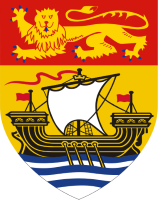






Welcome to coverage of the 2018 New Brunswick Legislative Assembly election, provided by yours truly at KortJackson.org!
How did we get to here? (A timeline)
After four long years, another fixed parliamentary term has come to an end in New Brunswick, and voters are preparing to go to the polls to decide the fate of the incumbent Liberal government led by Brian Gallant, the youngest incumbent premier in Canada. In 2010, the one-term Liberal government led by Shawn Graham was brought to a massive defeat by the Progressive Conservatives led by David Alward. This was quite an unusual occurance in that for the first time in New Brunswick's history, a incumbent government was relegated to opposition after just one term. Such an occurence became a lot more usual four years later, as Alward's Progressive Conservatives were led to a fairly close, yet decisive defeat by Brian Gallant and the Liberal party in 2014.
Gallant's government has not been without controversy, and throughout the parliamentary term, the 27 (Liberal) - 21 (PC) - 1 (Green) advantage deteriorated into a 24 (Liberal) - 22 (PC) - 1 (Green) - 1 (Independent) parliamentary situation with 2 vacant seats. While this means that in a 49 seat Legislative Assembly, Gallant's "Grits" (Grits is a common term for the Liberal Party and most of its counterparts) have technically been in a minority government for some time, only managing operations like a majority government by numerical supremacy alone. However, said controversies seem to be limited in scope, and the polling trends have shown the Grits usually in the lead by a substantial number, with only two polls showing the PC's ahead. If the polls are accurate as a whole, New Brunswickers appear content enough to restore the Grits to majority government, and likely with a larger majority than in 2014.
So, how does elections and government work in Canada? (and specifically New Brunswick)
Elections in Canada are done by first past the post voting. In essence, whomever gets the most votes in a riding (constituency), that person is deemed elected. The federal House of Commons (the Canadian Senate is appointed) and each of the provincial and territory legislatures follow the First Past the Post system. In addition, with the exception of Northwest Territories and Nunavut (non-partisan consensus governments), each province (plus Canada's House of Commons and the territory of Yukon) each have parties that nominate candidates to contest the ridings. Whichever party gains a numerical majority of seats (New Brunswick has 49 ridings, so 25 is the magic number) is considered to have obtained majority government, and the leader of that party tends to become the premier (unless it's the House of Commons, in which they become the Prime Minister). If a party gains the most seats of all the parties but lacks a numerical majority, they may form a minority government. In a minority government, a party may either govern alone and seek support on legislation on a bill-by-bill basis or attempt to form a coalition to reach a majority of seats. In general, a government must do two main things to retain control of government:
How did we get to here? (A timeline)
After four long years, another fixed parliamentary term has come to an end in New Brunswick, and voters are preparing to go to the polls to decide the fate of the incumbent Liberal government led by Brian Gallant, the youngest incumbent premier in Canada. In 2010, the one-term Liberal government led by Shawn Graham was brought to a massive defeat by the Progressive Conservatives led by David Alward. This was quite an unusual occurance in that for the first time in New Brunswick's history, a incumbent government was relegated to opposition after just one term. Such an occurence became a lot more usual four years later, as Alward's Progressive Conservatives were led to a fairly close, yet decisive defeat by Brian Gallant and the Liberal party in 2014.
Gallant's government has not been without controversy, and throughout the parliamentary term, the 27 (Liberal) - 21 (PC) - 1 (Green) advantage deteriorated into a 24 (Liberal) - 22 (PC) - 1 (Green) - 1 (Independent) parliamentary situation with 2 vacant seats. While this means that in a 49 seat Legislative Assembly, Gallant's "Grits" (Grits is a common term for the Liberal Party and most of its counterparts) have technically been in a minority government for some time, only managing operations like a majority government by numerical supremacy alone. However, said controversies seem to be limited in scope, and the polling trends have shown the Grits usually in the lead by a substantial number, with only two polls showing the PC's ahead. If the polls are accurate as a whole, New Brunswickers appear content enough to restore the Grits to majority government, and likely with a larger majority than in 2014.
So, how does elections and government work in Canada? (and specifically New Brunswick)
Elections in Canada are done by first past the post voting. In essence, whomever gets the most votes in a riding (constituency), that person is deemed elected. The federal House of Commons (the Canadian Senate is appointed) and each of the provincial and territory legislatures follow the First Past the Post system. In addition, with the exception of Northwest Territories and Nunavut (non-partisan consensus governments), each province (plus Canada's House of Commons and the territory of Yukon) each have parties that nominate candidates to contest the ridings. Whichever party gains a numerical majority of seats (New Brunswick has 49 ridings, so 25 is the magic number) is considered to have obtained majority government, and the leader of that party tends to become the premier (unless it's the House of Commons, in which they become the Prime Minister). If a party gains the most seats of all the parties but lacks a numerical majority, they may form a minority government. In a minority government, a party may either govern alone and seek support on legislation on a bill-by-bill basis or attempt to form a coalition to reach a majority of seats. In general, a government must do two main things to retain control of government:
1. The government of the day must demonstrate confidence of the chamber. This is initially established through a Speech from the Throne
in which the monarch (Elizabeth II) or the vice regal representative
(usually either the Governor-General at the federal level or the
Lieutenant Governor of the respective province/territory) reads the
official statement of the government on what they intend to achieve for
the term. Once established, confidence is maintained by succeeding in
passing motions of confidence and defeating motions of no confidence.
If the Speech from the Throne is voted upon in the negative, OR a
motion of no confidence is passed, OR a motion of confidence fails, the
government has lost the confidence of the chamber.
2. The government of the day must demonstrate they can secure supply. Supply in the Westminster Parliamentary system is the budget. The government of the day must demonstrate they can pass a budget. If the budget fails to pass, it is akin to a loss of confidence of the chamber.
2. The government of the day must demonstrate they can secure supply. Supply in the Westminster Parliamentary system is the budget. The government of the day must demonstrate they can pass a budget. If the budget fails to pass, it is akin to a loss of confidence of the chamber.
Majority
governments (and minority governments via coalitions, if they hold
together) are generally able to pass both of these tests regularly.True
minority governments, on the other hand, do not tend to last
particularly long. All it takes for a minority government to topple is
for the numerically superior opposition and third parties to combine
together to pass a motion of no confidence (or deny supply). In these
cases, an early election is called, though sometimes the numerically
superior opposition may cobble together a majority of votes on their
own and form government instead (see British Columbia after the 2017
provincial election). In provincial, territorial or federal parliaments
that have a fixed term law on the books, the latter option is often
preferred if available to avoid early elections, and a early election
is only called if no other path to an alternative government exists.
Image of New Brunswick Legislative Assembly is by Christopher Craig and is under a CC 2.0 SA license.
Image of Shield of the Arms of New Brunswick is a "public domain creation", details here.
